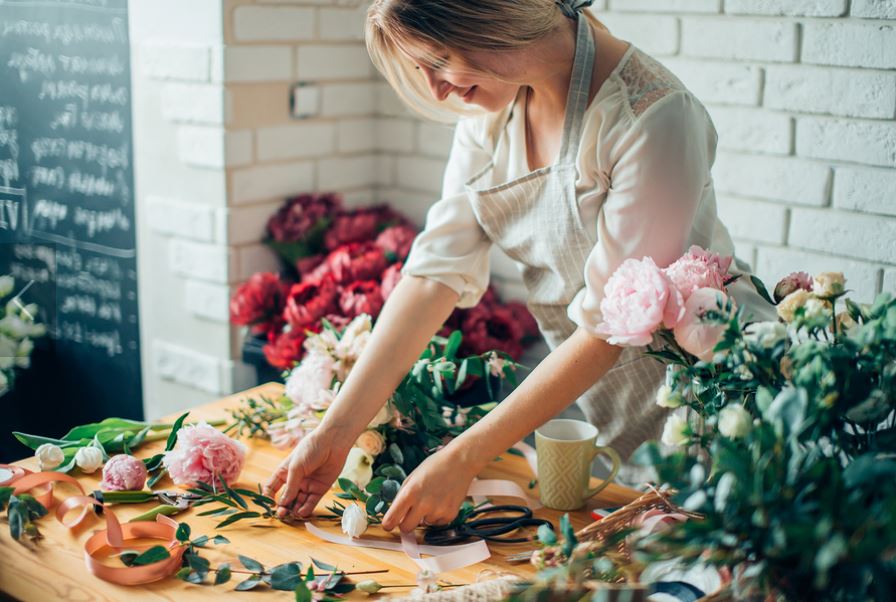Floristry is a captivating and time-honored art form that involves the creative arrangement of flowers and plants to create stunning bouquets, centerpieces, and decorative displays. At the heart of this enchanting world is a florist, a skilled professional who possesses a deep understanding of flowers, colors, and design aesthetics.
You may be considering a career in floral design or floristry and wondering if working with flowers like peonies, dahlias, or sunflowers is the correct path for you.
Wanna learn about career advice for florists, read this article by Indeed.com.
In this comprehensive guide, we will delve into the intricate world of floristry, exploring the role of florist, his/her training and skills, the art of floral design, types of floristry businesses, and the evolving trends in the floral industry.
Who is a Florist?
An expert in designing, making, and selling floral arrangements is a florist. Although most of them work in flower shops or floral studios, some could be independent contractors or work from home.
Florists are artists who create one-of-a-kind flower and plant arrangements using their imagination and organizational abilities. They design eye-catching elements, sometimes tailored to a client’s specifications, for a variety of events. Setting objectives and choosing your professional path may be made easier by learning about the prerequisites and procedures for becoming a florist.
The Role of Florists
Creative Artisans
Florists are artists who use flowers as their medium to craft visually appealing arrangements. They have a keen eye for design principles, color harmonies, and an understanding of the symbolic meanings associated with different flowers.
Event Specialists
Florists play a crucial role in various events, from weddings and birthdays to corporate functions. They collaborate with clients to understand their vision and create bespoke floral arrangements that enhance the ambiance of the occasion.
Emotional Connect
Florists contribute to expressing emotions through flowers. Whether it’s conveying love, sympathy, or joy, florists skillfully select and arrange blooms to evoke specific feelings, making flowers a powerful and meaningful gift.
Training and Skills
Floral Design Education
Many florists undergo formal education and training in floral design. Courses cover a range of topics, including flower identification, color theory, design principles, and techniques for preserving and arranging flowers.
Hands-On Experience
Practical experience is essential in the world of floristry. Florists often work as apprentices or gain hands-on training in floral shops, learning about the care and handling of various flowers, as well as the intricacies of creating different arrangements.
Business and Customer Service Skills
Successful florists not only have creative flair but also possess strong business acumen and excellent customer service skills. They manage inventory, pricing, and customer interactions with professionalism and enthusiasm.
The Art of Floral Design
Color Harmony and Selection
Florists are experts in understanding color harmonies and the psychological impact of different hues. They skillfully combine flowers in a way that complements each other, creating visually stunning and harmonious arrangements.
Design Principles
Florists apply design principles such as balance, proportion, contrast, and focal points to create arrangements that are aesthetically pleasing and well-balanced. These principles guide them in crafting arrangements suitable for various occasions and settings.
Flower Language
Florists are versed in the language of flowers, known as floriography. Different flowers carry specific meanings, and florists use this knowledge to convey sentiments through their arrangements. For example, red roses symbolize love and passion, while lilies represent purity and renewal.
Types of Floristry Businesses
Local Florist Shop
Local florists operate brick-and-mortar shops, providing a range of floral products and services to their community. They often specialize in everyday arrangements, seasonal bouquets, and event floristry.
Online Florists
With the rise of e-commerce, online florists have become increasingly popular. These businesses allow customers to browse and order floral arrangements online, with delivery services ensuring that fresh blooms reach the recipient’s doorstep.
Event Florists
Event florists specialize in providing floral arrangements for weddings, corporate events, and other special occasions. They work closely with event planners and clients to create customized designs that enhance the overall decor.
Funeral Florists
Specializing in sympathy and funeral arrangements, these florists create displays that convey compassion and support during challenging times. They are skilled in designing funeral wreaths, casket sprays, and sympathy bouquets.
Evolving Trends in the Floral Industry
Sustainable Floristry
With a growing awareness of environmental issues, there is a trend towards sustainable floristry. Florists are increasingly using locally sourced, seasonal flowers and adopting eco-friendly practices to reduce the carbon footprint of their businesses.
Unique Floral Installations
Florists are exploring larger-than-life floral installations for events and weddings. From flower walls to hanging installations, these dramatic displays add a touch of artistry and uniqueness to special occasions.
Dried and Preserved Flowers
Dried and preserved flowers are gaining popularity for their longevity and sustainability. Florists are incorporating dried blooms into arrangements, creating lasting and aesthetically pleasing designs.
DIY Flower Kits
Some florists offer do-it-yourself (DIY) flower arranging kits, allowing customers to try their hand at creating their floral masterpieces at home. These kits often include fresh flowers, tools, and step-by-step instructions.
FAQs
What is the job description of a florist?
Florists, or floral designers, put together silk, dried, and live flowers and foliage to create artistic arrangements. They also assist clients in choosing ribbons, other embellishments, and flowers and containers.
What skills are essential for becoming a successful florist?
Successful florists require a blend of creative flair, training in floral design, hands-on experience, and strong business and customer service skills. This combination allows them to craft beautiful arrangements while effectively managing their business.
How do florists convey emotions through their floral arrangements?
Florists convey emotions through the careful selection and arrangement of flowers, utilizing color symbolism and the language of flowers (floriography). Each bloom is chosen to evoke specific sentiments, making floral arrangements powerful expressions of love, sympathy, or joy.
What are the emerging trends in the floral industry?
The floral industry is experiencing trends such as sustainable floristry, unique floral installations, the use of dried and preserved flowers, and the popularity of DIY flower kits. Florists are adapting to these trends, incorporating eco-friendly practices and offering innovative approaches to floral design.
How do online florists operate, and what services do they provide?
Online florists operate through e-commerce platforms, allowing customers to browse and order floral arrangements online. They often provide a wide range of products, including bouquets, arrangements, and specialty designs, with delivery services ensuring fresh flowers reach the recipient.
What is the significance of the language of flowers in floristry?
The language of flowers, known as floriography, holds great significance in floristry. Florists use their knowledge of this language to convey specific meanings and sentiments through their arrangements. For example, red roses symbolize love, while lilies represent purity and renewal.
Conclusion
Floristry is a captivating blend of artistry, skill, and emotion, with florists serving as the architects of beauty in the world of flowers. From creating bespoke arrangements for special occasions to conveying heartfelt messages through blooms, florist plays a pivotal role in enriching our lives. Whether you’re drawn to the traditional charm of a local flower shop or exploring the convenience of online floristry, the world of florists is a flourishing realm that continues to evolve with creativity and innovation.


